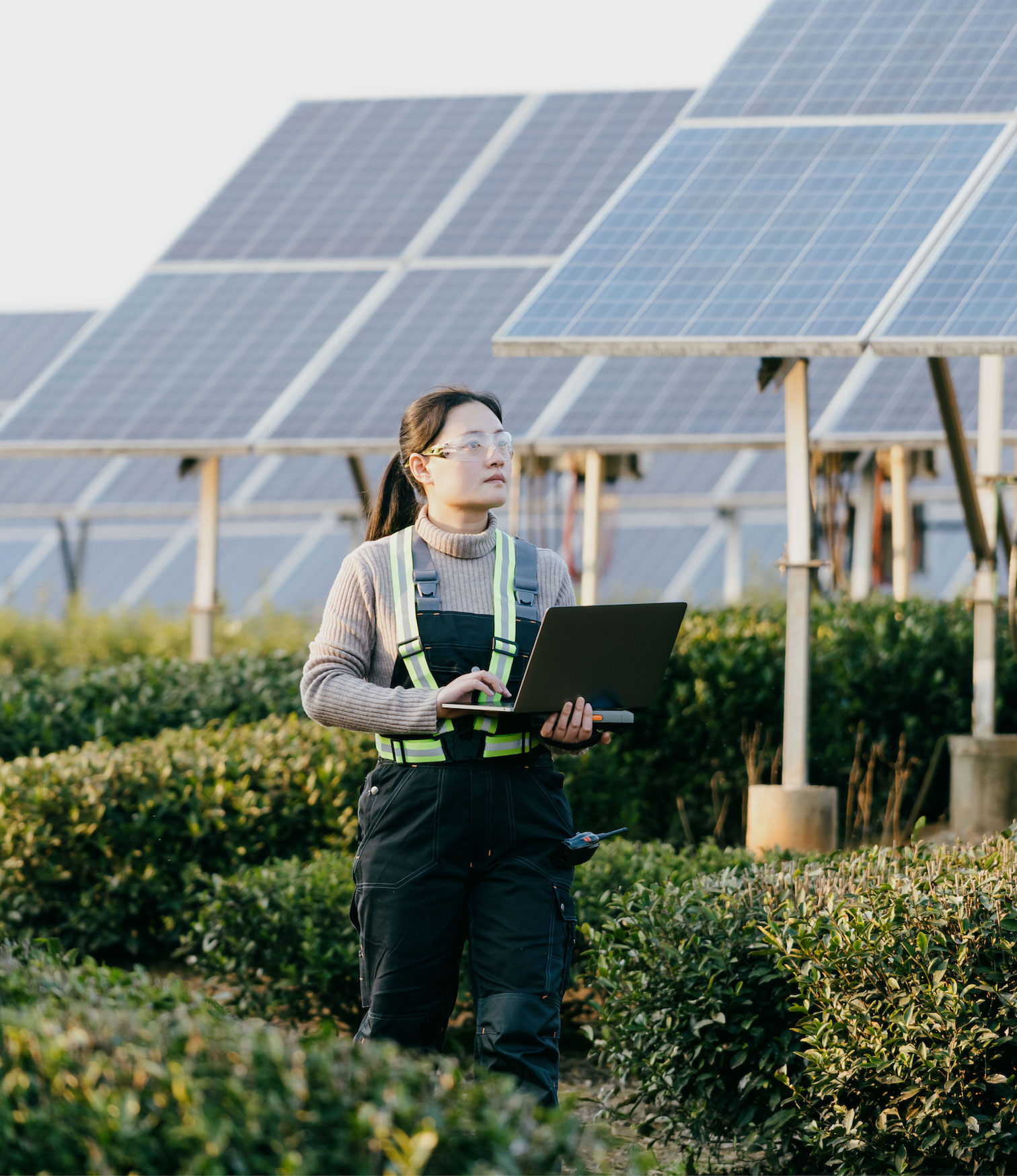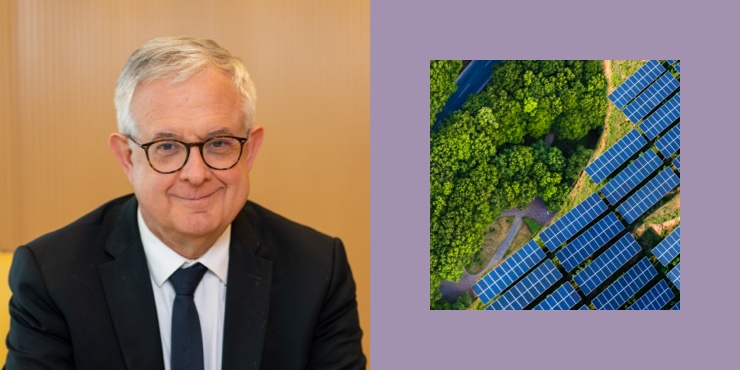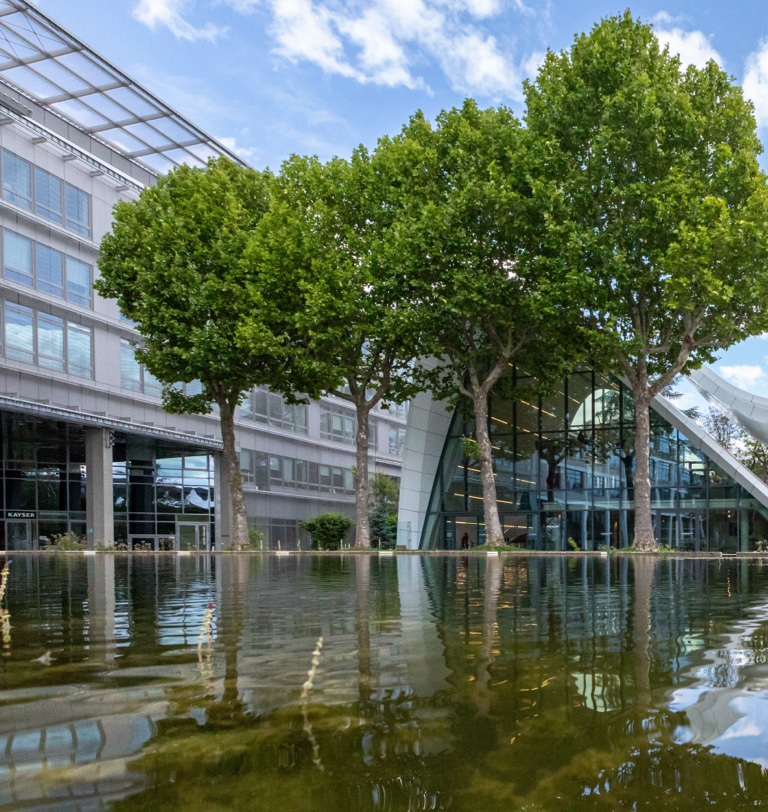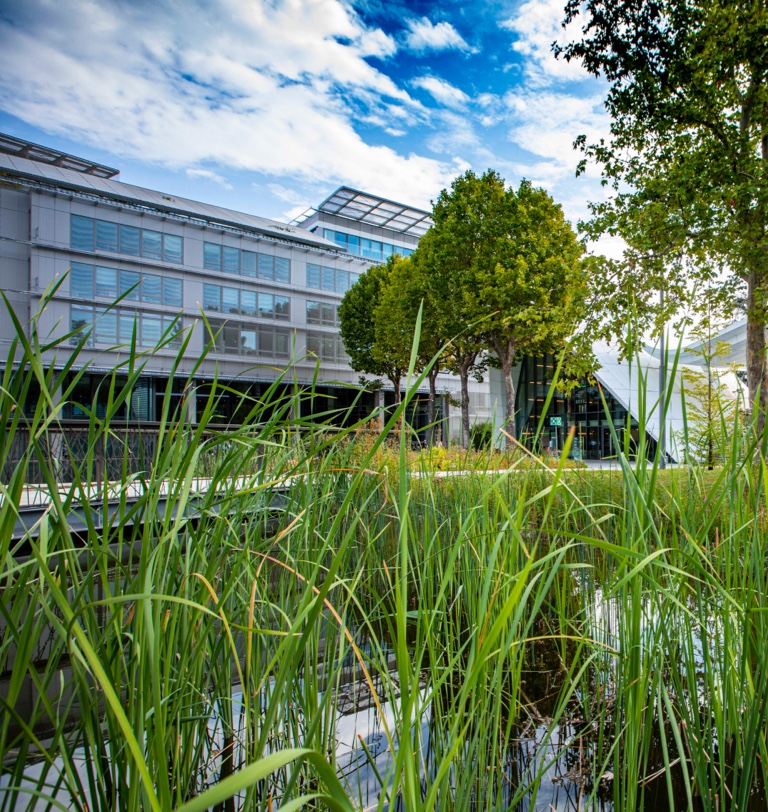-
Since June 2019
Crédit Agricole Group has been deploying a strategy of gradually reallocating its financing and investment portfolios in line with the goals of the 2015 Paris Agreement, and has committed to a phase-out of thermal coal by 2030 and 2040.
-
Starting in 2020
Implementation of the 2019 climate strategy in sector thermal coal policies within the entities, continued financing of renewable energies and acceleration of responsible investment policies.
-
In 2021
Commitment by the Group to help achieve carbon neutrality by 2050 by joining four Net Zero initiatives for the financial sector.
-
In 2022
Strong acceleration of the climate strategy with the launch of Crédit Agricole Transitions et Énergies (Transitions and Energies), to make energy transitions accessible to all and accelerate the emergence of renewable energies, supported by the publication of decarbonisation targets by 2030 for five financing sectors in order to contribute to carbon neutrality by 2050.
Playing a role in decarbonising the economy is a fantastic opportunity for a bank such as ours, which has always financed progressive projects.
Accelerating the advent of renewable energy
Accelerated investment and financing in renewable energy is imperative if we are to contribute effectively to the energy transition. Through these levers, Crédit Agricole is making the demanding choice to promote energy efficiency, facilitate the production and use of renewable energy and contribute to the emergence of low-carbon projects by using the strength of its universal model to support transitions.
-
- CA Leasing & Factoring: through its subsidiary Unifergie, finances the projects of farmers, companies, local authorities and actors in transition, especially in the field of renewable energy. At 31 December 2022, Unifergie, together with the Group’s banks (Regional Banks, LCL, the international retail banks), provided €1,012m in funding in the energy sector (renewable energies and energy efficiency), representing the equivalent of 865 megawatts (MW).
- Crédit Agricole CIB: the world’s number three bookrunner, is a leading player in the arrangement of “green, social and sustainability” bonds with $35.5bn for its major customers in 2022(1).
The portfolio of low-carbon and transition assets financed by Crédit Agricole CIB amounts to €16bn (financing of renewable energy projects, low-carbon buildings, clean transport, water and waste management, energy efficiency). - LCL: supports the transition of its corporate customers (SMEs and MSEs) with “impact financing”: earmarked financing (green bonds), in which the funds are allocated to an asset or project with environmental or social benefits, and indexed financing, in which the margin is indexed on the company’s own ESG performance criteria.
Ambition for the Group by 2030: treble the financing of renewable energies and increase the volume of renewable energy production (TWh) by 3.6 times
(1) Source : Bloomberg
-
-
- CA Assurances: France’s largest institutional investor in renewable energy with 11.8 GW of installed capacity at the end of 2022.
- Crédit Agricole Group: €20.4bn in cash invested in “green, social and sustainability bonds”.
-
-
As part of its efforts to make the transition to a low-carbon economy accessible to all investors, Crédit Agricole makes a range of offers available to its customers.
- Regional Banks: “Committed and Responsible” offers, which incorporate climate and environmental issues into their management criteria. The banks offer some twenty investment solutions that enable customers to diversify their financial assets by supporting socially responsible companies committed to their transformation.
- LCL: first complete line of “Climate Impact with LCL” asset investments, which provides each major asset class (listed and unlisted equities, structured products, real estate) with assets active in the fight against climate change that encourage the reduction, neutralisation or offsetting of CO2 emissions (€1.7bn in inflows at the end of 2022).
- Amundi: a range of funds supporting climate transition in the main asset classes, notably by accelerating the development of its Net Zero offer to enable its customers to align their portfolios with any Net Zero commitments they may have.
- Indosuez Wealth Management: responsible products in all asset classes following the launch in 2019 of the “Indosuez Objectif Terre” international equity fund, which invests in securities of companies active in the fight against global warming and the preservation of natural resources.
-
-
Livret Engagé Sociétaire (savings account)
With the Livret Engagé Sociétaire, Crédit Agricole is one of the first major banks to offer a bank savings product with a strong, measurable promise: every euro in this account actually contributes exclusively to the financing of eligible projects (creation of a shared house for senior citizens, installation of photovoltaic panels on coworking buildings, financing of a short-circuit dairy farm, etc.). This is an opportunity for our 11.5 million mutual shareholders to become even more involved in the major climate and social challenges, at any time and regardless of their means.
-
+ €12bn
in guaranteed financial resources for the selected themes thanks to the transformation of the existing Livret Sociétaires into Livret Engagé Sociétaire.
Making the transition accessible to everyone
As a cooperative and mutual bank, Crédit Agricole is involved in all aspects of the energy transition for all its customers, from developing their own access to low-carbon energy sources, low-carbon mobility solutions or assisting in the renovation of residential or commercial buildings. In this way, usefulness and universality are combined to achieve a just transition.
Net Zero: our targets and commitments by sector
Achieving carbon neutrality by 2050, known as “Net Zero 2050”, represents a decisive milestone on the path to be followed at the global level so that global warming does not exceed 1.5°C by 2100. In 2021 and 2022, Crédit Agricole S.A. and its subsidiaries decided to join four Net Zero coalitions of financial institutions committed to carbon neutrality by 2050. To align their portfolios with this target, Crédit Agricole S.A. and its subsidiaries based their pathways on the work of the International Energy Agency (NZE 2050 scenario) with the guidance of a scientific committee formed for the purpose.
Gradually withdrawing from fossil fuels
Targets adopted by Crédit Agricole S.A. over several years, which are part of a broader approach embodied by the decarbonisation pathways resulting from membership of the Net Zero 2050.
-
2015 - Coal Mining
Commitment to end funding for coal mining.
-
2019 - Thermal coal
Announcement of the end of funding for thermal coal (mines, power plants, dedicated transport infrastructure) by 2030 (in OECD countries) and 2040 (in the rest of the world).
-
2022 - Oil and gas
- 25% reduction in carbon emissions per million euros invested by Crédit Agricole Assurances (2025 compared to 2019).
- 25% decrease in CACIB’s exposure to petroleum by 2025.
- Stopping direct funding for new oil extraction projects.
- Exclusion of direct financing of non-conventional oil and gas extraction (shale oil and gas, tar sands).
- Exclusion of direct financing of oil and gas extraction in the Arctic.
- Annual analysis of the transition plan of Oil & Gas customers, based on the choice of a benchmark scenario (Net Zero 2050 etc.) and on the strategy of investment in decarbonisation.
-
2022 - Electricity
- Tripling of the financing of renewable energies and 3.6x increase in the TWh of financed renewable energy by 2030.
- Expansion of the customer base to better reflect the growing diversity of the sector.
- Finalisation of the divestment of coal-fired power plants and increased selectivity in gas-fired power plant financing.
Reducing our operational carbon footprint
After joining the Net Zero 2050 alliances and in line with the announcements in the Societal Project of the bank’s commitment to contributing to carbon neutrality by 2050, Crédit Agricole S.A. and its subsidiaries are continuing their efforts to reduce the greenhouse gas emissions linked to their own operations.
-
-50%
in our own direct carbon footprint by 2030.
In line with the latest scientific evidence, Crédit Agricole S.A. and its subsidiaries submitted their reduction trajectories to the Science-Based Target initiative (SBTi) in October 2022 and are committed to going beyond the minimum requirements of the SBTi methodology:
-
-50%
in greenhouse gas emissions related to energy consumption by buildings and the vehicle fleet between 2019 and 2030 (absolute target);
-
-50%
in greenhouse gas emissions linked to business travel between 2019 and 2030 (absolute target).
In addition, a target has been set to commit suppliers of Crédit Agricole S.A. and its subsidiaries to a trajectory of reducing their own carbon footprint: suppliers representing 40% of spending on goods and services will be assigned science-based Net Zero targets by 2027.
Our voluntary contribution to carbon neutrality with the Livelihoods funds
Crédit Agricole S.A. and its subsidiaries have been offsetting part of their residual emissions through investment in the Livelihoods Carbon Funds since their launch in 2011. These funds finance projects that help combat climate disruption, restore and protect natural ecosystems with high potential and improve the living conditions of rural communities. The Livelihoods Funds finance projects for reforestation and restoration of degraded ecosystems, agroforestry, regenerative agriculture, and small-scale rural energy (improved stoves) in Africa, Asia, Latin America and, since 2021, in France.
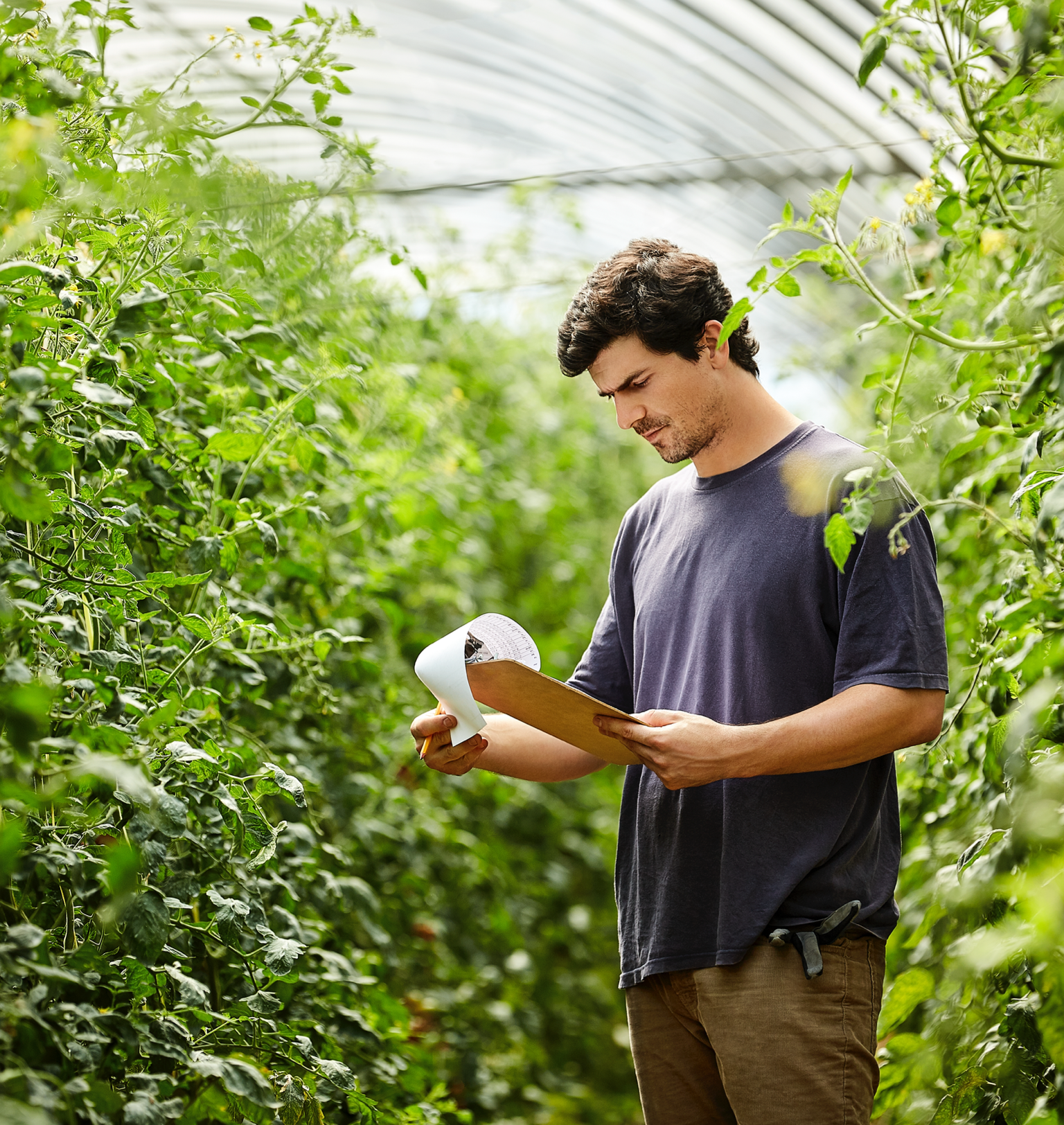
Our actions to promote biodiversity and natural capital
In addition to the challenge posed by climate change, we are facing another environmental crisis: the collapse of biodiversity and the loss of nature. In accordance with the UN Convention on Biological Diversity (CBD), Crédit Agricole S.A. recognises the central role of biodiversity conservation for humanity and the importance of preserving it in connection with climate change.
Economic actors can be affected in various ways by the loss of biodiversity and the degradation of nature (reduced agricultural yields, coastal erosion etc.), or even have a negative impact on it (deforestation, fragmentation of ecosystems etc.). For financial institutions, the challenge is to measure the (negative or positive) impacts and dependency of their customers on ecosystem services, i.e. the services provided by nature, in their financing and investment portfolios. Crédit Agricole S.A. has begun to explore and evaluate tools capable of aggregating several biodiversity-related indicators, and in 2021, it began assessing the impacts and dependency of its portfolios in various business lines on biodiversity and ecosystem services.
The Group has already launched an action plan structured around four main themes:
-
Biodiversity preservation measures
Integrating biodiversity conservation measures into financing and investment policies, especially in sectors of high direct relevance to Crédit Agricole Group’s financing portfolio, such as energy and infrastructure.
-
Supporting collective initiatives
Supporting collective initiatives to combat nature degradation and biodiversity loss, working with national and international coalitions to better understand the impacts and risks of nature degradation and biodiversity and to better understand the opportunities to participate in its preservation, conservation and restoration.
-
Participating in pilots
Participation in Taskforce on-Nature-Related Disclosures (TNFD) pilots to test and provide feedback on the voluntary reporting framework being developed.
-
Launching green products
Launch of innovative green products and projects in support of nature and biodiversity: Insurance products dedicated to forests, partnership with Reforest’Action (CA Assurances), “Nature en ville” programme (CA Immobilier), “Indosuez Blue Cycle” solidarity-based structured products and the creation of an investment fund in Spain to reforest burnt land (CA Indosuez) etc.
Fostering biodiversity on our sites
The Montrouge and Saint-Quentin-en-Yvelines sites are “LPO Refuges” (Ligue pour la protection des oiseaux) for birds, and are committed to accommodating and preserving local biodiversity.
Managed by Crédit Agricole Immobilier, the SQY Park campus in Saint-Quentin has been awarded the ÉcoJardin label and, since 2020, the Evergreen campus in Montrouge was one of the first sites in France to be awarded the BiodiverCity Life label, which recognises the rational maintenance of green spaces. In addition, 124 beehives are being installed on the Group’s various sites for production of more than two tonnes of honey per year.


